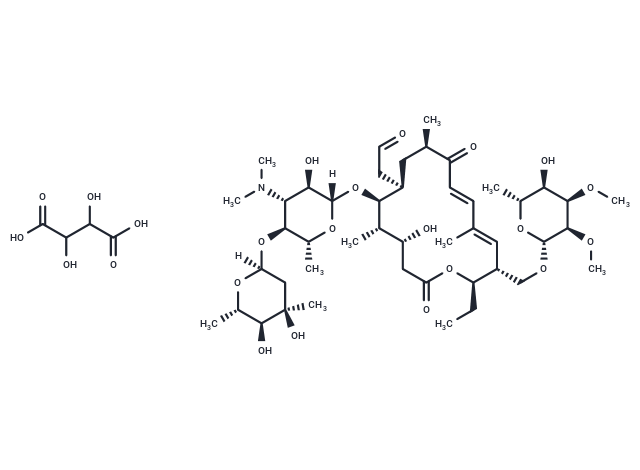Shopping Cart
- Remove All
 Your shopping cart is currently empty
Your shopping cart is currently empty

Tylosin tartrate, a macrolide antibiotic, is approved for the control of mycoplasmosis in poultry.

| Pack Size | Price | Availability | Quantity |
|---|---|---|---|
| 25 mg | $39 | In Stock | |
| 50 mg | $57 | In Stock | |
| 100 mg | $73 | In Stock | |
| 500 mg | $163 | In Stock | |
| 1 mL x 10 mM (in DMSO) | $45 | In Stock |
| Description | Tylosin tartrate, a macrolide antibiotic, is approved for the control of mycoplasmosis in poultry. |
| In vitro | After intravenous administration of 10 mg/kg Tylosin tartrate, dehydrated camels exhibit significantly higher serum drug concentrations, reduced volume of distribution, and lower clearance rates, with a marked decrease in overall drug elimination speed when compared to normal camels. Furthermore, dehydrated camels receiving a 20 mg/kg dose of Tylosin tartrate via intramuscular injection show reduced average absorption time and lower drug concentrations in the serum. Treatment of neonatal piglets with oral Tylosin tartrate (50 mg/kg, twice daily) for 10 consecutive days, starting 14 days post-intranasal infection, significantly mitigates the severity and incidence of gross pulmonary lesions. Tylosin enhances splenocyte proliferation, yielding higher levels of proliferation in the conditioned medium than in chicken whole spleen cell cultures. Additionally, Tylosin increases the anti-tumor activity of chicken splenic cells. |
| In vivo | Compared to the control group, Tylosin tartrate (25 mg/L) significantly inhibited methane production, indicating that the concentrations commonly found in swine lagoons negatively affect anaerobic metabolism. In anaerobic incubated sludge, the 90% clearance times for Tylosin, its derivatives Tilmicosin and Relomycin ranged from 30 to 130 hours; this reduced to 12 to 26 hours post aeration. The degradation of Tylosin followed a biphasic pattern with a rapid initial loss followed by a slower elimination phase. Under storage conditions in Milli-Q water (pH 5.7–6.7) at 22°C, Tylosin tartrate remained stable for at least one month. |
| Molecular Weight | 1066.19 |
| Formula | C46H77NO17·C4H6O6 |
| Cas No. | 74610-55-2 |
| Smiles | OC(C(O)C(O)=O)C(O)=O.[H][C@@]1(C[C@@](C)(O)[C@@H](O)[C@H](C)O1)O[C@@H]1[C@@H](C)O[C@@]([H])(O[C@H]2[C@@H](CC=O)C[C@@H](C)C(=O)\C=C\C(\C)=C\[C@H](CO[C@@H]3O[C@H](C)[C@@H](O)[C@@H](OC)[C@H]3OC)[C@@H](CC)OC(=O)C[C@@H](O)[C@@H]2C)[C@H](O)[C@H]1N(C)C |
| Relative Density. | no data available |
| Storage | Powder: -20°C for 3 years | In solvent: -80°C for 1 year | Shipping with blue ice. | |||||||||||||||||||||||||||||||||||
| Solubility Information | H2O: 183 mg/mL (173.9 mM) DMSO: 276 mg/mL (262.3 mM) Ethanol: 179 mg/mL (170.1 mM) | |||||||||||||||||||||||||||||||||||
Solution Preparation Table | ||||||||||||||||||||||||||||||||||||
Ethanol/H2O/DMSO
| ||||||||||||||||||||||||||||||||||||

Copyright © 2015-2024 TargetMol Chemicals Inc. All Rights Reserved.